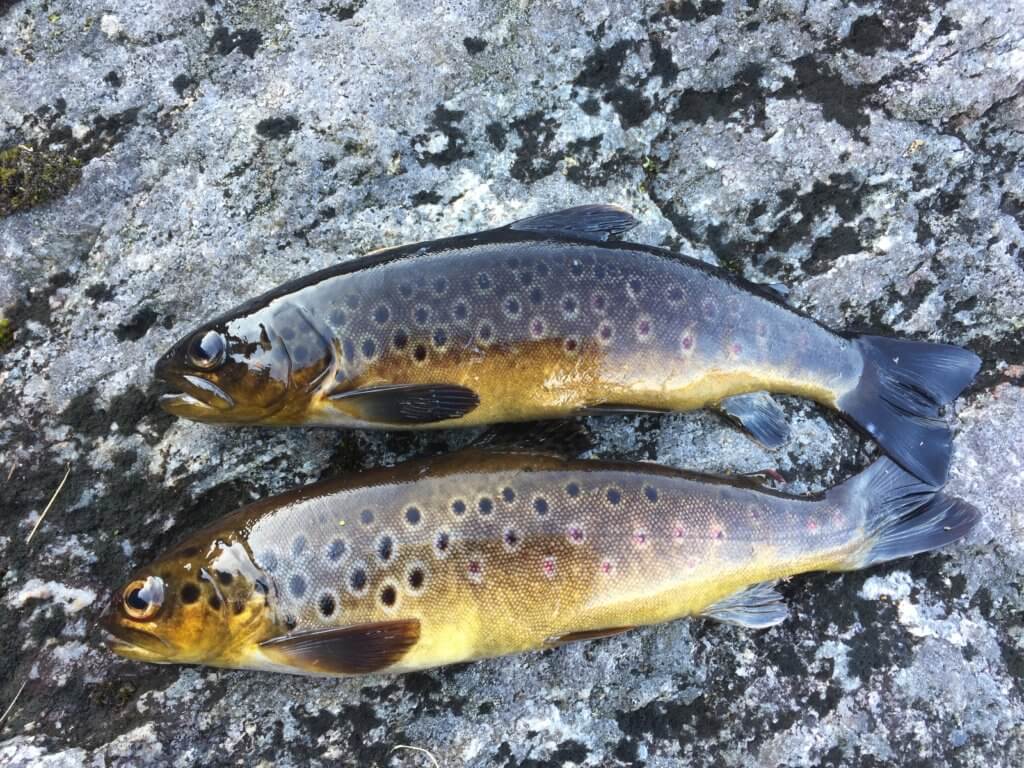
I often think of these as the freshwater equivalent of Mackerel: they are stunningly pretty fish; they snatch at any morsel of food in front of them, making them remarkably easy to catch; they are a doddle to cook and taste fantastic; and they can only be caught from spring to autumn (in this case the result of seasons set out in legislation rather than presence or absence). Across large parts of the Scottish Highlands and Islands (as well as parts of England and Wales) almost any freshwater you can find, deeper than a couple of metres, is likely to support them. A cheap fishing rod, float and hook with worm is all you need.
Of course, there is another kind of trout fishing, involving the same species, where things are very different. Along well-known trout rivers and the more esteemed trout lochs you will find well-dressed figures with expensive fly-fishing rods and even more expensive techniques who have paid handsomely for the privilege of trying to catch large specimen fish. In their eyes a worm isn’t bait, it’s cheating. They might also turn their noses up at the small size of some of the fish that I have taken home.
If you simply want to catch enough to eat that night (and you don’t necessarily want to spend the whole day fishing) then any technique that works is fine – why deliberately handicap yourself? And don’t feel guilty about taking small fish, as long as they are at least big enough to be worthwhile processing into food. My logic is that if I need 3lbs of fish then taking six half-pound individuals is probably no more detrimental to the population than taking a single 3lb fish. This approach also avoids having to put back lots of smaller fish that have been hooked in the hope that they will survive, whilst waiting for that elusive larger fish. To be fair, returning trout to the water is usually easy enough though this can be more of a problem with some sea fish.
I’m prepared to be shot down in flames by a fisheries scientist and some decent modelling but until then, taking a few of these home for tea is a near-perfect way to end a day in the Highlands.
Previous ‘Wild food’ posts by Ian Carter:
Sloe Gin
[registration_form]
I understand your comment regarding fly-fishermen, but as someone who does both, I can absolutely agree that nothing tastes sweeter than a little fresh brownie. Indeed after an enjoyable day of just drowning fluff. I have resorted to the last hour or so just resting and watching a rod tip. Using bait isn’t cheating, you could say its ‘traditional’ since bait fishing has been around a lot long than fluff-chucking.
I have not only fished for them I have built dams to improve the habitat for them. Of course that was before any idea of Beavers doing the work for me and the Beavers will improve the numbers of Trout where they are allowed to thrive and not be shot out like on the Tay tributes.
” A cheap fishing rod, float and hook with worm is all you need.”…and a permit..or in England and Wales..”a fishing licence”. As a fly fishing angler in a southern Scotland, mainly lowland river with large trout…I cant help thinking that enriching highland rivers [and many southern ones with sources in Uplands] by rewilding their headwaters with native woodland would produce larger trout…
Dave – I see the investigations mindset is still there! You are right of course though with small lochans in remote parts of the Highlands it is often difficult to know who you could get a permit from. I suspect that, very often, the fishing has no commercial value and no-one is too bothered.
Years ago whilst working in the USA, I picked up an 8 piece wt7 fly rod for ~£100 in Cabellas (the dollar was much weaker then). Ever since then it has been the first thing in the rucksack on any backpacking trip. I always carry food in (relying on my fishing prowess would be very foolhardy), however the occasional brownie really made any trip extra special.
Mike – I do much the same with a little telescopic rod that collapses down small enough to fit inside a rucksac and can be set up within a few minutes. Even bait can be gleaned from the local environment if you forget the dig the earthworms before you set off – I’ve used caterpillars in the past, found on moorland close to the water’s edge, and they do work.
Trout are great fish to see, catch and eat, of course by doing so your are also removing the major predator of salmon eggs and fry too.